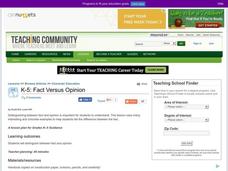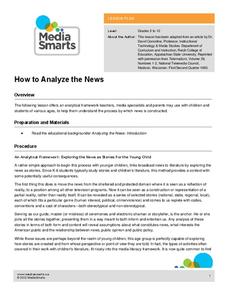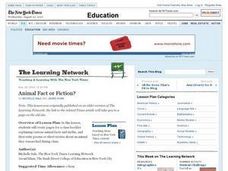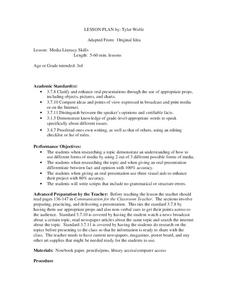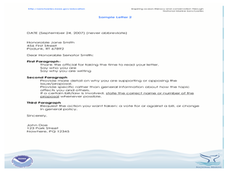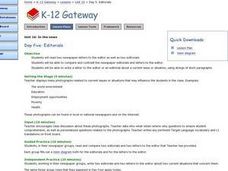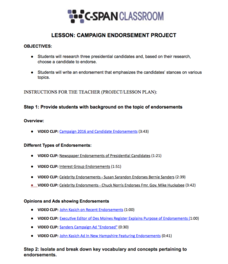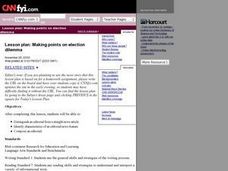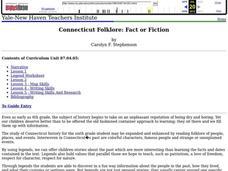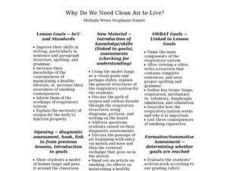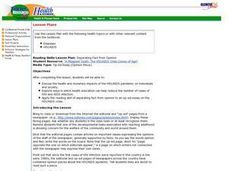Curated OER
Fact Versus Opinion
Students differentiate between fact and opinion. They define fact and opinion, then listen to and identify examples of each. Students identify different books where facts and opinions can be found, and cut out newspaper and magazine...
Curated OER
"The Clever Monkey"
Second graders complete a variety of activities related to the book "The Clever Monkey" by Rob Cleveland. They answer story comprehension questions, and rewrite the story. Students also complete a comprehension and fact or opinion...
The New York Times
Evaluating Sources in a ‘Post-Truth’ World: Ideas for Teaching and Learning about Fake News
The framers of the United States Constitution felt a free press was so essential to a democracy that they granted the press the protection it needed to hold the powerful to account in the First Amendment. Today, digital natives need to...
Curated OER
A Way with Words
How do facts and opinions impact the news? After reading "How to Cover a War" from the New York Times, middle schoolers evaluate the claims in the article. They also consider the media's responsibilities in reporting during wartime....
Media Smarts
How to Analyze the News
Teach kids how to watch television, specifically the news, with this creative idea for learners of all ages from the Media Awareness Network. The elementary school plan focuses on presenting news as a story and uses Jon Scieszka's story...
Curated OER
Animal Fact or Fiction?
Read and discuss the article "Welcome to Cicadaville (Enter at Your Own Risk)" to gain a better understanding around the confusion regarding cicadas and locust swarms. In groups your young analysts research statements about animals to...
Curated OER
Study Skills- Fact and Opinion
Students engage in a variety of activities in order to achieve the objectives of a layered curriculum unit. They take notes on the differences between fact and opinion. Students also use a newspaper in order to recognize opinionated...
Facebook
What Is Verification?
One of the most important skills news consumers and social media users must develop is the ability to determine the veracity of stories they read or view. Here's an interactive lesson plan that teaches high schoolers how to verify news...
Curated OER
Media Literacy Skills
You're on camera! Third graders find a news story and research it to get more information. Everyone uses their found information to write a script and create their own news broadcast!
Curated OER
Thinking Out Loud
Students share opinions about whether a series of statements from the internet constitute facts or opinions. They read and analyze blogs published in on the web in order to understand the use of fact, opinion, and tone of voice when...
Curated OER
In My Opinion
Young writers craft letters to the government stating their opinion on different topics. They pick an environmental or ocean issue, research it, and craft their formal persuasive letter. Ensure your learners include supporting facts and...
Curated OER
Editorials
Students investigate editorials. In this literacy critical thinking lesson, students compare and contrast two newspaper editorials and two letters to the editor by completing a Venn diagram. Students work in groups to write authentic...
C-SPAN
Campaign Endorsement Project
So many politicians, so many endorsements! Learn to differentiate between facts as well as the process of endorsements with an informative resource. Class members watch current endorsement videos, research candidates from three different...
Newseum
Bias Through History: Analyzing Historical Sources
Young journalists use the E.S.C.A.P.E. (evidence, source, context, audience, purpose, and execution) strategy to evaluate historical and contemporary examples of bias in the news. The class then uses the provided discussion questions to...
Curated OER
Don't Let the Earth Down
Writing a persuasive argument starts with a clear thesis. Using this resource, your class will write a persuasive paper on a conservation issue. They will then transform their argument into a 30-second public service announcement. If...
Curated OER
Making Points on Election Dilemma
Students define a straight news article, and identify characteristics of an editorial news feature. They read a CNN article that examines the 2000 presidential election, and determine what is factual and what is opinion.
Curated OER
Connecticut Folklore: Fact or Fiction
Sixth graders read legends to learn the history of Connecticut in a fun informative way.
Curated OER
Why Do We Need Clean Air to Live? - Biology Teaching Thesis
Students name the main components of the respiratory system. They write a reaction that contains complete sentences, and uses proper spelling and grammar, after viewing a video. Students define the following terms: lungs, respiration,...
Curated OER
The Quilting Connection....a Teaching Unit on Slavery, the Underground Railroad And Quilting
Students research the Internet, read designated books and selection, participate in discussions and write short reports while completing this series of lessons about slavery and the Underground Railroad. As a final project, they design a...
Curated OER
Nonfiction Text Features
Identify features of a nonfiction article in this language arts instructional activity. Middle schoolers apply comprehension strategies as they read the parts of the article, and analyze the author's key points. Additionally, they...
Curated OER
Teaching Others About Being Deaf
Students read two articles about how college students taught others about being blind or deaf. In their school, they interview students with a physical challenge and use the internet to research how to write about those with...
Curated OER
Active Reading with American History
Explore connections within and between informational texts with this lesson about encyclopedia articles. Middle schoolers write encyclopedia articles focusing on topics in American history. They discuss how to determine credibility...
Curated OER
Where Do You Stand?
Scholars assess a government's ability to intervene in personal health decisions. They research basic facts about euthanasia and describe their opinions about new legislation passed in the United States Congress about an individual's...
Curated OER
Separating Fact from Opinion
Students read, "A Misspent youth: The HIV/AIDS Crisis Comes of Age", and discuss the article or write their answers to the questions imbedded in the instructional activity. They write their own essay.


